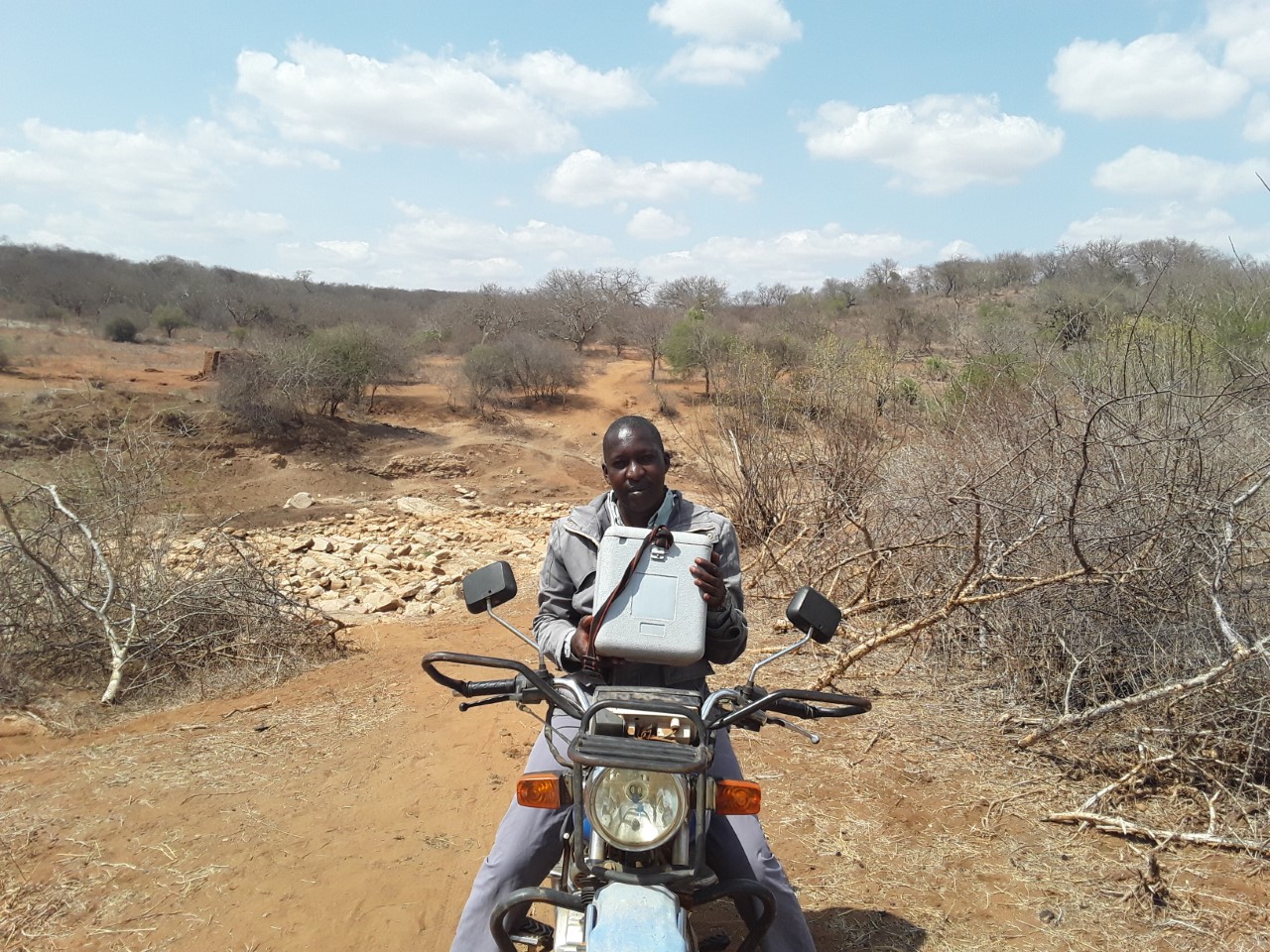By Joyce Chimbi (Lead Writer)
Kamboo, Yindalani and Yiuma Mavui are a set of hard-to-reach villages located 17 and 28 kilometres away from Makindu sub-county hospital and 10 and 22 kilometres away from the nearest electricity grid. As a result of the distance from the sub-county hospital and not being connected to the grid, the three health facilities in these villages could neither stock vaccines nor offer routine immunisation on demand.
“Every morning, I used to collect vaccines at Makindu sub-county hospital and transport them inside a vaccine carrier box to Ndalani dispensary. Once the vaccines are inside the carrier box, they are only viable for six hours…whatever doses remain unused must be returned to storage at Makindu sub-county hospital for refrigeration or thrown away,” said Benson Musyoka, the nurse in-charge of Ndalani dispensary in Yindalani village.
Transport choices in and out of these hard-to-reach communities are limited. Residents either walk, ride bicycles, or hire a motorbike taxi. There are no rental houses therefore the nurses who work there acquired loans and purchased motorbikes — the cheapest brand is about $1,700 — to facilitate movement from their residences in Makindu town to the health facilities.
Besides vaccines, patients in need of drugs that required refrigeration could only receive services at the Makindu sub-county hospital. Parents with children aged two years and below, struggled to take their children to the sub-county hospital for routine immunisation. As a result, although the three heath facilities offered scheduled immunisation services once or twice a postweek, Musyoka said immunisation rates were less than 25 percent across the three villages.
Maternal health services out of reach
The health facilities were also unable to provide maternity services. Pregnant mothers like Nzula Kilonzi had to travel 17 to 28 kilometres, one way, to give birth. Kilonzi delivered three children at home because she was unable to walk the long distance to the sub-county hospital.
“…we could not stock Oxytocin, and this meant we were unable to provide delivery services. Pregnant mothers were referred to Makindu sub-county hospital irrespective of the distance. There are no ambulances in the area, and this is a vulnerable community who cannot afford to hire a motorbike, it is also very risky to ride on a motorbike when pregnant because of the rough terrain. Many opted to deliver at home,” said Francis Muli, the nurse in-charge of Kamboo health centre.

The 2014 Kenya Demographic and Health Survey (KDHS), indicated that the maternal mortality rate (MMR) in Makueni County was at 400 deaths for every 100,000 live births, while the nationwide MMR was at 362. In 2017, the Ministry of Health identified that postpartum haemorrhage accounted for 9 out of every 10 maternal deaths in Kenya.
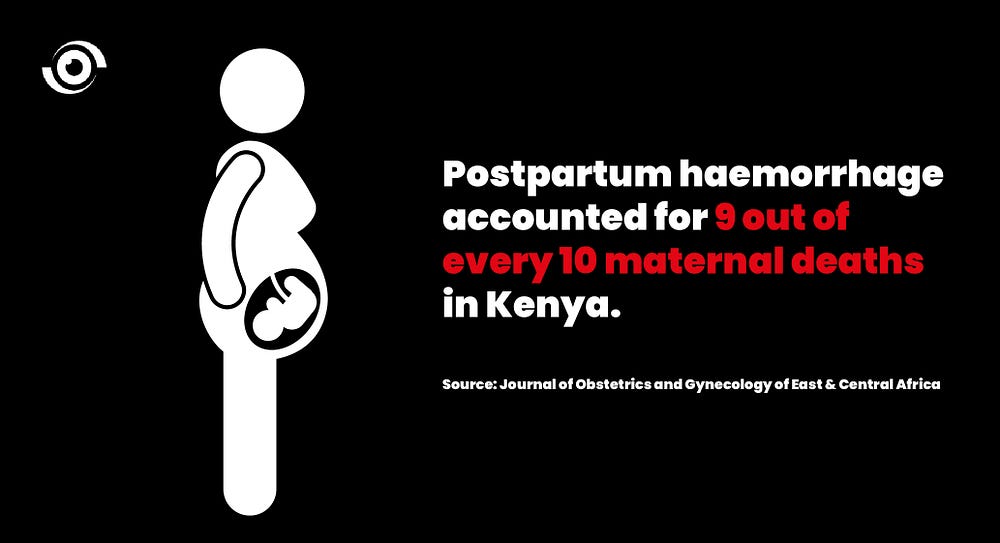
Lack of cold chain capacity
In February 2019, a low cost but high impact solar powered freezer was donated to Kamboo health centre by Green Life Energy, a private company that specialises in environmentally friendly products. Vaccines are generally stored in a fridge where temperatures range from 2 to 8oC. This solar powered freezer can go below zero degrees celsius, which is ideal for more heat sensitive vaccines. The freezer maintains temperatures of 8 degrees celsius at the top and gets colder the closer one gets to the bottom of the freezer.
“It saves time because we can collect many vaccine doses from the sub-county hospital at a go, and they will remain viable for a longer period and therefore available when needed. This prevents missed opportunities and dropouts,” Muli explained.
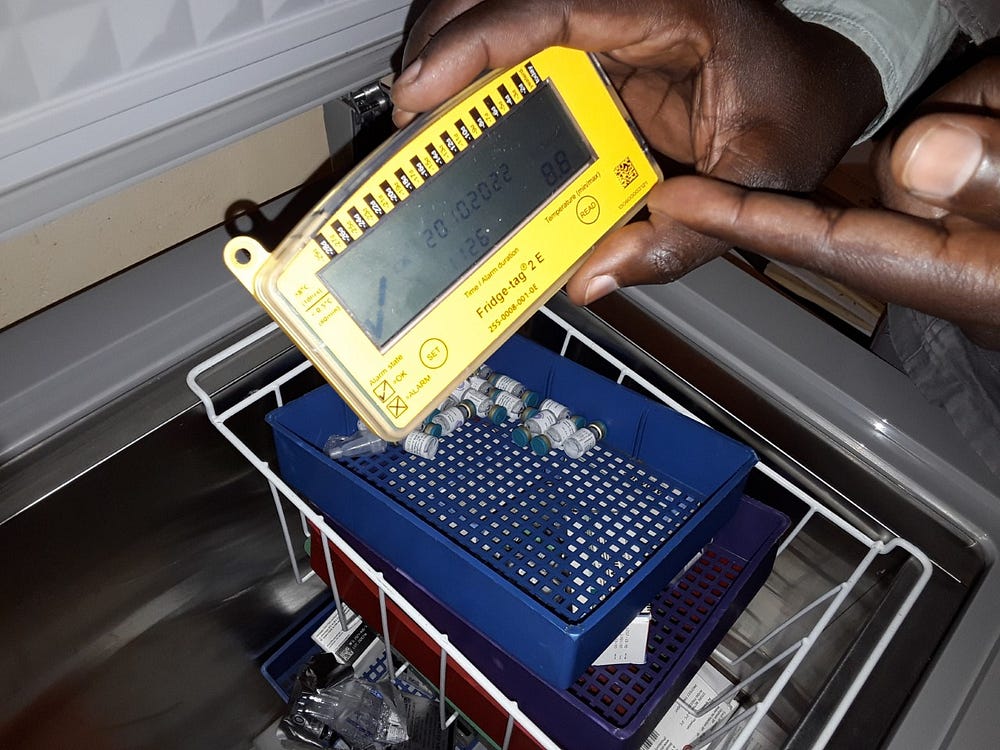
The freezer is equipped with a vaccine temperature monitoring gadget which provides a history of temperature readings and helps determine whether vaccines maintained the recommended temperature limits, especially overnight. Muli further explained that the freezer is directly connected to the solar panel. “The panels are light sensitive, so it’s very ideal even during the rainy season. The only requirement is that the solar panels are wiped at least once a month because when they collect dust, their capacity to absorb heat or light is compromised,” he added.
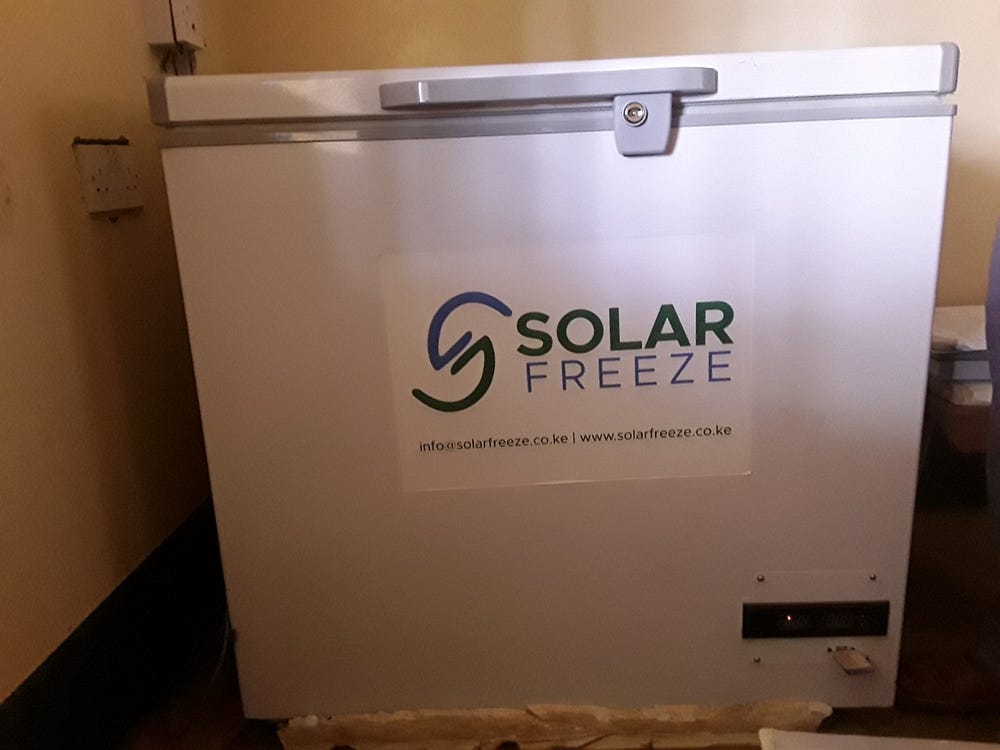
Buying back time
The installation has restored the vaccine cold chain, improving availability and access to polio, measles and tuberculosis vaccines as well as maternal health services across the three villages and surrounding areas. Pregnant women in Kamboo village can deliver at Kamboo health facility where the solar freezer is domiciled.
“In 2018, I was pregnant and when I started bleeding, my husband hired a motorbike to take me to Makindu sub-county. The rough and long journey to the hospital made the situation worse and I had a miscarriage. Today, we have maternity services at Kamboo and it is a walking distance from my house,” said Terry Maria Koki, a resident of Kamboo village.
Pregnant women in Usungu and Ndalani villages no longer walk for 28 kilometres to the sub-county hospital. They continue to receive all relevant services at their respective health facility until the last trimester when they are referred to Kamboo health facility, 10 kilometres away, for skilled delivery.
“It is a miracle that we now have delivery services nearby at Kamboo health center and this is where I delivered my last baby at the end of 2019,” said Kilonzi.
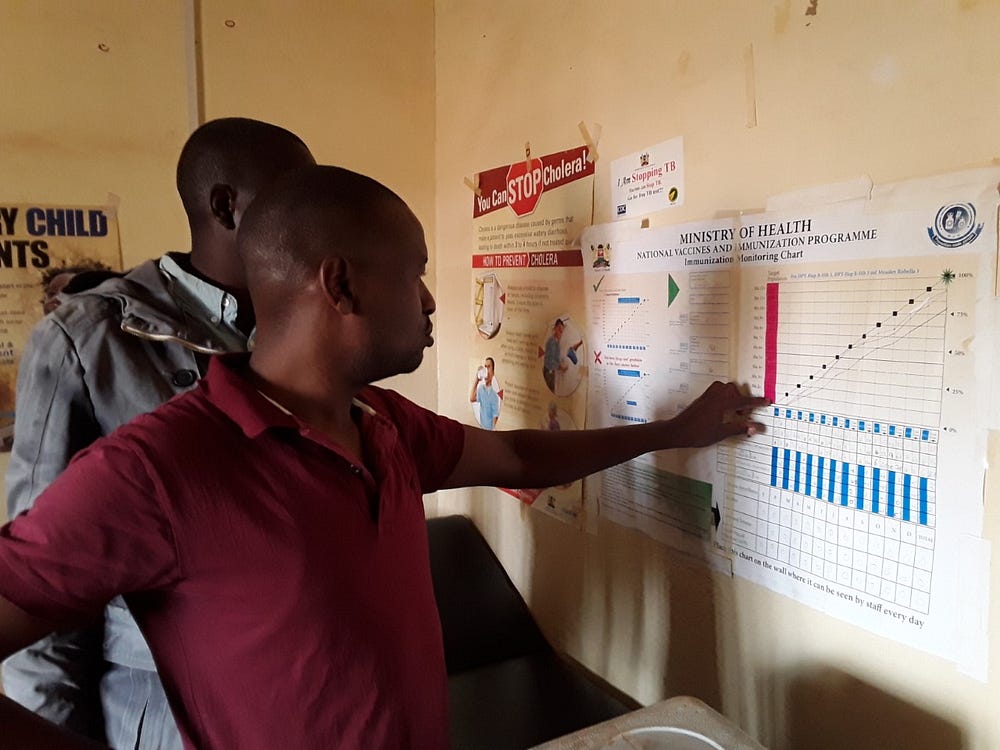
Usungu and Ndalani dispensaries are each located only 10 kilometres away from Kamboo health centre. Two to three times a week, Matali and Musyoka collect doses of all standard routine immunisation vaccines except for Yellow Fever because it is out of stock. The vaccines are transported to their respective dispensaries in a carrier box. The nurses say that the carrier box has a capacity to hold up to 500 doses of different vaccines, including that of COVID-19 because the vials are very small in size.
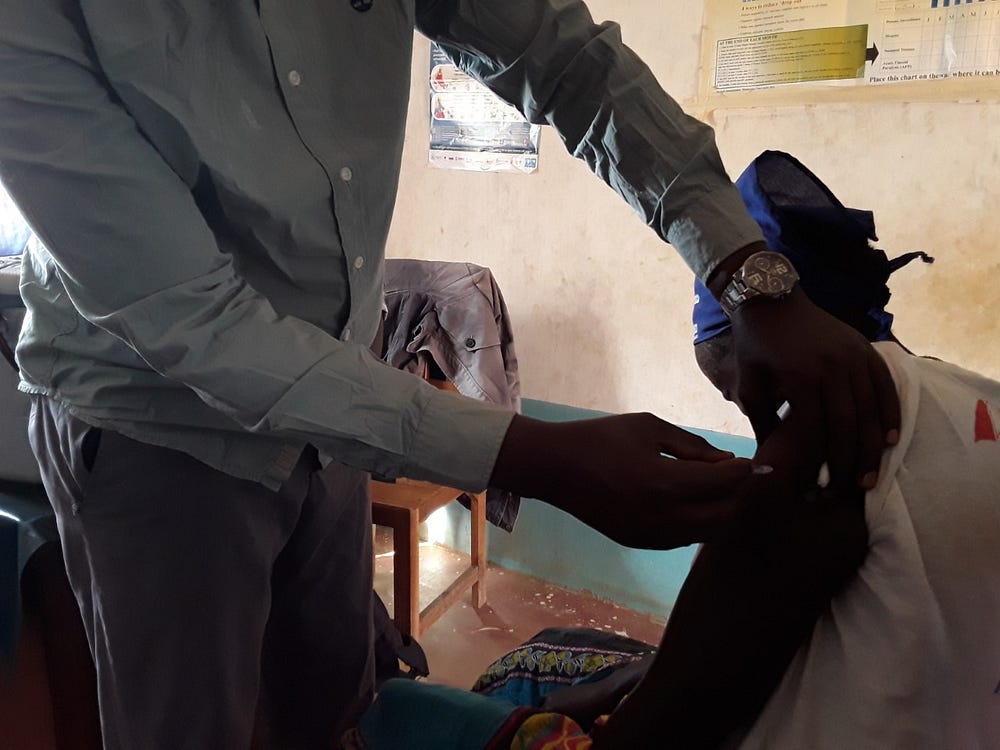
Improved immunisation coverage
Facility records show that overall immunisation coverage is at 95 percent, which is well above the government target of 90 percent. Inside the offices of the nurses in-charge of the three health facilities, immunisation charts provided by the Ministry of Health are visibly displayed showing vaccination rates as is the standard practice in government facilities.
At Ndalani dispensary, the charts show immunisation rate for measles have surpassed the target of 100 percent as additional or transit patients from four surrounding villages and the neighbouring Kitui County receive services at the dispensary. The overall immunization rate for all standard vaccines is at 50 to 65 percent.
However, in Usungu dispensary, the immunisation rate for measles is at 75 percent and for other vaccines, coverage is hovering at 50 percent.
Unintended outcome
The Human papillomavirus (HPV) vaccine was introduced in Makueni in March 2021, and facility records show that 46 girls have received the complete dose of the vaccine at the Ndalani health centre, while another 17 girls received their first HPV dose in 2022 and are due for the second dose.
“I was very happy when we were told by the nurses that our little girls will receive vaccination to prevent cervical cancer. My sister lived with cervical cancer for seven years and had she been vaccinated, she would have been alive today,” said Damaris Mulinge, a mother of six from Yindalani village.
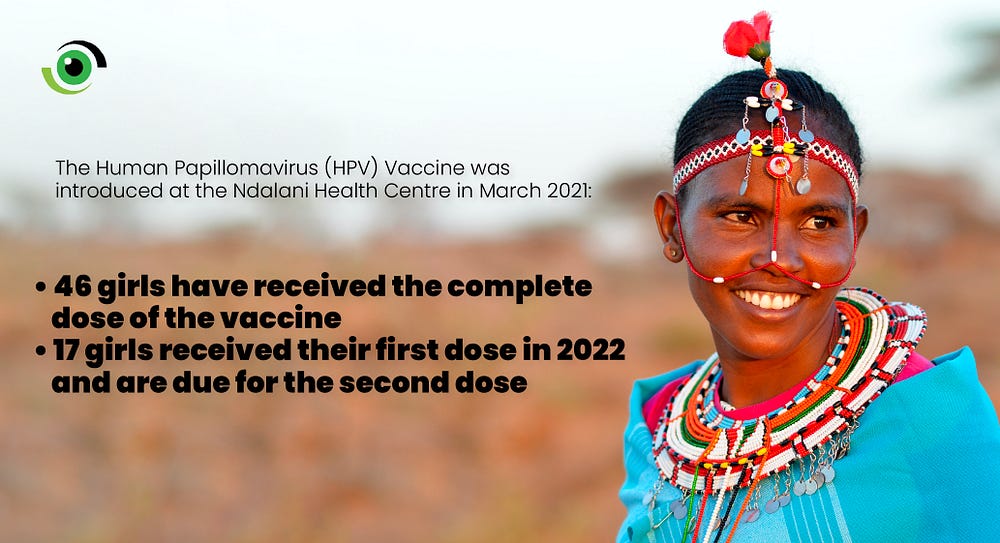
Filling the gaps in services provision
The solar powered freezer which was donated to test its viability in a resource strapped health facility has proven to be a game changer for the three health facilities. However, unused vaccines can only be stored in Kamboo and must be taken back to the facility within six hours.
Being the only health workers in their respective facilities, Musyoka and Matali are forced to shut down the facilities early to ensure that the vaccines are returned within the required time frame. Understaffing is a very big problem in many hard-to-reach health facilities and must be addressed to promote equitable and uninterrupted health service delivery.
There is no denying the evidence that the Green Life Energy freezer donated has plugged a service delivery gap. Health providers in the area say it would be ideal to have a solar powered freezer in all health facilities as a low cost, high impact strategy to improve access to maternal and child health services across the expansive hard-to-reach areas. Nurses at the three health facilities say the next step is for the new County government to procure the solar freezer for health facilities off the electricity grid in Makueni County. They are optimistic that this will happen soon.


